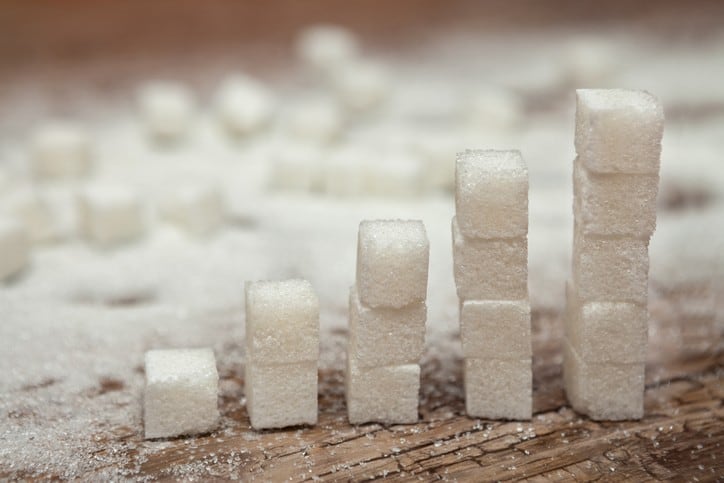From allulose to erythritol to xylitol, food manufacturers have a growing number of alternatives to table sugar to choose from these days, says The Supplant Company founder Dr Tom Simmons, a Cambridge University academic who realized his post-doctoral research on plant science could have some pretty exciting real-world applications.
But available substitutes are often expensive, hard to scale, or lack all of the properties we know and love about sucrose (browning, caramelization, etc), said Simmons, who has filed a suite of patents around technology that uses enzymes to break down polysaccharides (long chains of sugars) in fibrous plant materials from corn cobs and wheat straw or oat husks into oligosaccharides and sugars, which are then combined to create what he calls ‘sugar from fiber.’
Performs like a sugar, metabolized more like a prebiotic fiber?
Supplant sugars from fiber performs just like sucrose in food applications from cakes to chocolate, has about a third of the sweetness of sucrose, and just under half the calories, and can be used to replace some or all of the sugar in a given application, depending on the sweetness level you’re looking for, said Simmons, who has raised $26m to date from investors including Coatue, EQT, Felicis, Khosla, and Mantaray.
For nutrition labeling purposes, it has 1.8 calories per gram, and is classified as a sugar and a fiber, with the fiber portion of the mix conforming to the FDA's new definition of dietary fiber, claimed Simmons, who plans to (initially) scale up the technology in the US market, where the company has already put together a GRAS determination (which it plans to send to the FDA) and has attracted the most interest and investment.
“It’s metabolized like fiber, and it reaches the large intestine where some of it passes through you and some is metabolized by gut bacteria, so that’s a prebiotic effect,” he told FoodNavigator-USA.
As for labeling, he claimed, the product could be described on the ingredients list as: 'Sugars from fiber.'
He added: “We’ve been in discussions with the FDA, regulatory lawyers and consultants, and it’s an interesting time because the FDA is having a rethink about all this [how some carbohydrates and sugars are labeled on the nutrition facts panel if they are metabolized differently than sucrose] because the reality is, not all sugars are equal.”
How is Supplant ‘sugars from fiber’ made?

The Supplant Company (Formerly known as Cambridge Glycoscience) can use a variety of upcycled feedstocks or agricultural waste/side streams from wheat straw to oat husks to corn cobs to paper pulp, which are composed mainly of cellulose and hemicellulose, says founder and CEO Dr Tom Simmons, who was accepted into the high-profile Y Combinator accelerator program in 2018.
Depending on the source material, this is then ground and pre-treated in some way (typically thermally) in order to ‘loosen it up’ so that Simmons’ enzymes can get to work, he says. These effectively chop up the long chains of sugars into shorter chains of oligosaccharides and simpler sugars, which Supplant then combines.
The firm has filed a suite of patents, says Simmons, but the “strongest bit of IP is actually the composition of the ingredient itself; it’s the specific composition which allows us to faithfully mimic the properties of sucrose in food products for the first time.”
10 grams of Supplant Sugars from fiber contains 18 calories (vs 40 for regular table sugar), 10 grams carbs, 1.5 grams of fiber, and 4.5 grams of sugar for nutrition labeling purposes, claims the company, which says the sugar is also low-glycemic:
"A blood sugar study showed that the glycemic response of Supplant sugars from fiber is less than 15% of the glycemic response to glucose."
The go-to-market strategy
The Supplant Co (parent company, US-based Supplant Inc) has samples out with multiple manufacturers, and sees itself as both a b2b branded ingredients supplier and potentially a CPG brand selling products in the retail sugar market, said Simmons, who recently teamed up with Chef Thomas Keller, who has added ice cream, cookies and other products using Supplant sugars from fiber to the menus at three of his high-end restaurants (the French Laundry and Bouchon Bakery in California, and Per Se in New York).
“We’re not going to license the technology to a manufacturer and sit back on the royalties," said Simmons.
"We're going to run this thing ourselves, although we’ll work with co-manufacturers on production [the process doesn’t require proprietary equipment].”
Aside from the obvious attraction of a low-glycemic ingredient that behaves like sugar but has fewer calories and may also have prebiotic effects, the upcycling angle and scalability of the production process helped attract investors and excite potential customers, said Simmons.
“We’re using the most abundant bio-renewable resource on the planet [as a feedstock] and we think this can really scale globally in a way that other ingredients really cannot, so we can really go mainstream and create an entirely new space in the $110bn sugars and sweeteners market.
"Plant fiber is the most abundant source of sugars in the natural world. Using the fiber-rich parts of crops that currently don't make their way into our food will be crucial for the future of our agricultural ecosystem."





